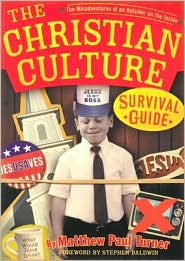Again, if you are interested, read about this series of posts here, The Christian Culture Survival Guide.
I left off last time talking about Christian movies and music, and today I'm going to talk about Christian television.
I used to watch the Trinity Broadcasting Network, which is a 24-hour, 7 days a week Christian programming network. There are Christian made for television movies, televangelists, televised church sermons, Saturday morning Christian cartoons, weekday night "pledge infomercials", etc. I even remember a few of the televangelists that had regular appearances, such as Rod Parsley, Joel Osteen, Dan and Paula Crouch, T.D. Jakes, Ed Young, John Hagee, Eddie Long, etc.
Although these people have a great number of Christian fans, they are not without ridicule. Many of them are known for their "prosperity gospel", and Joel Osteen is the biggest culprit. As a matter of fact, I recently saw a Rapture Ready forum post talking about the man, and how he has been sent from the devil himself to preach a false gospel. Of course, if you take a look at his main points (graciously provided by one of the forum members), they are:
1) Have a positive attitude toward ourselves- (because sin is so offensive...we all have such beautiful potential yaknow)Joel Osteen actually preaches that we should develop better relationships, have positive attitudes, and embrace life... If you ask me, he's way better than anybody else on the normal broadcasting schedule. He doesn't sound half bad, considering the fact that he's often roasted for cutting out a lot of the Jesus crap from his messages (although, not entirely God-fluff free). At the very least, he's better than this guy.
2) Develop better relationships..(but he fails to mention the only relationship that has the capability to produce change and better "us"es....Hmm...Jesus ...)
3) Embrace where we are: ( yes, and if we listen to him, we most likely are on the wide road leading straight to hell..how caring of him)
To cut the crap, TBN was founded by Christians Paul and Jan Crouch, and Jim and Tammy Faye Bakker. It now seems that it is run by Paul and Jan, since you see their faces the most (perhaps I may be wrong, since the last time I spent too long in this channel was a while ago).
1. Lose the wig. (Just look at that photo).
2. New musical talent. (Seriously, I never even heard of the people who used to play music on this network, even when I was a Christian. And they were bland.)
3. Less crying, and more compelling storytelling.
4. Encourage to give, rather than guilt. (This is a huge criticism of televangelists).
There you have it. That's pretty much what the whole chapter comes down to, since the end is just a short couple of paragraphs talking about Christian bookstores, and a list telling you what you can do with all of those "WWJD" bracelets you have.
There is one thing I do one to quote (for the sake of quoting, really), and it's the third item on the chapter's last list (which is three Jesus branded crap that Christians would have been better off never creating).
Right below the "Test-a-mints", and Jabez crapolla, just to leave you with something to think about, here is...
3. The "Fish Eating Darwin" car decal - Everywhere you look, there's a tan mini-van with the "Jesus fish eating the Darwin thingy" pasted on its bum. Why did we lower ourselves to the standards of evolution? [Pg. 130].












